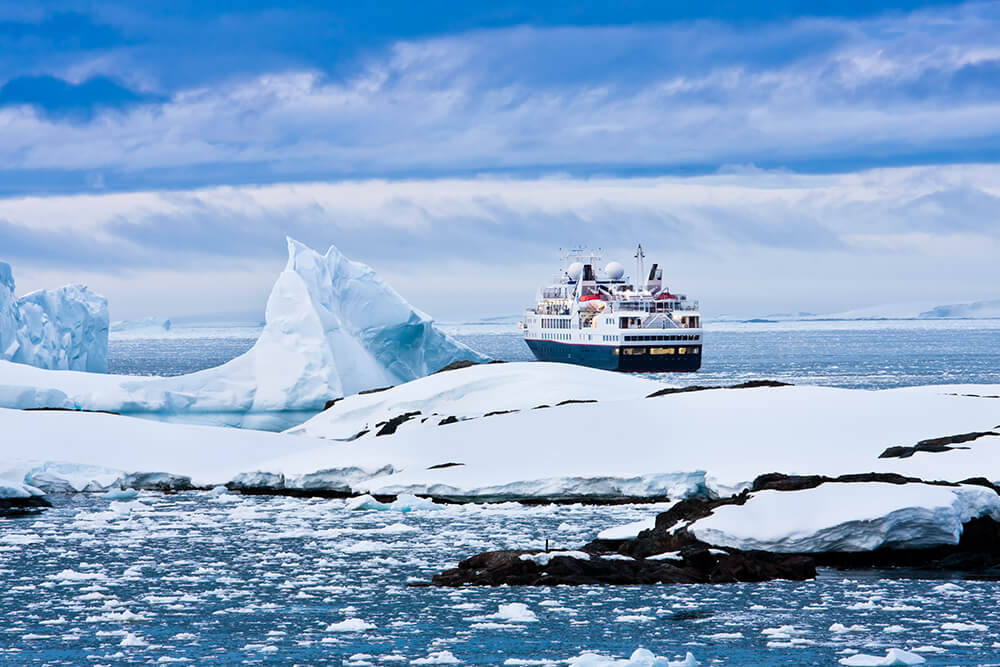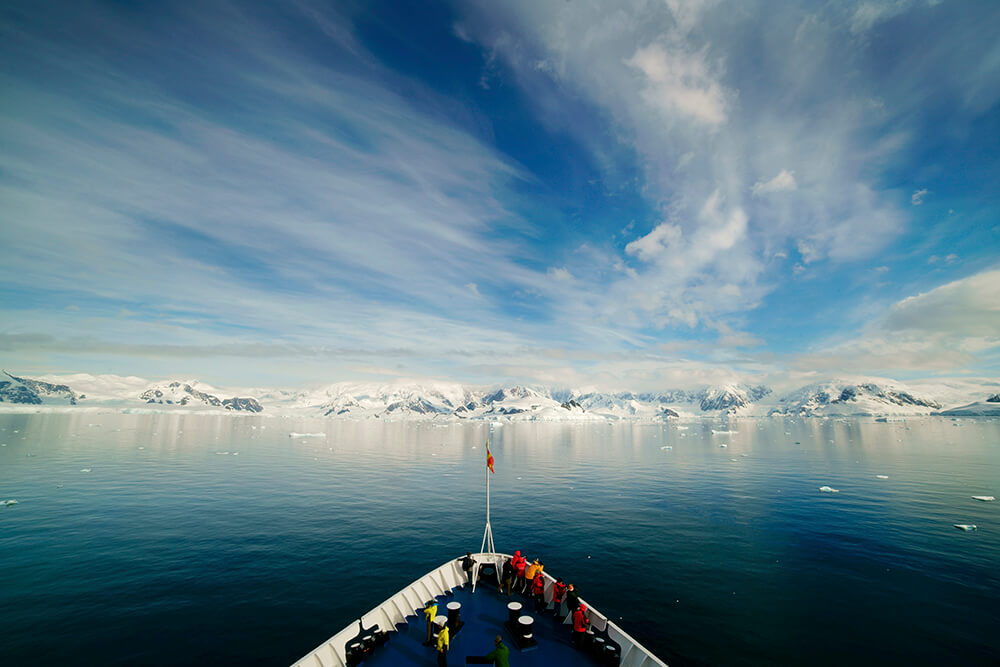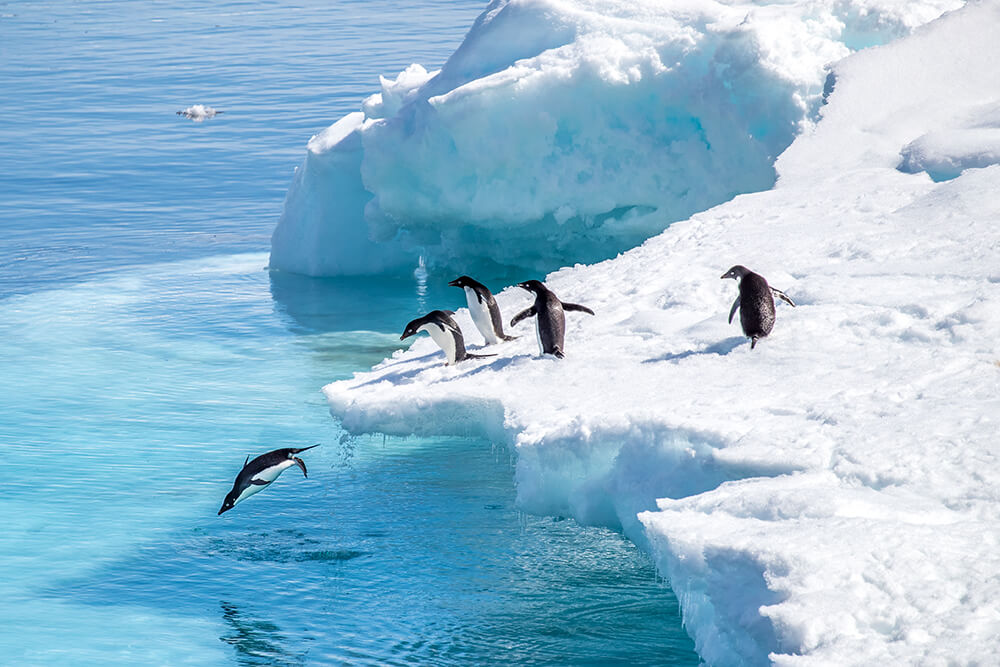Expedition Antarctica
Exploring the most remote continent on earth.

Journeying to the coldest, windiest and most isolated continent on earth is on the bucket list of every serious traveller.
RACQ Travel Area Coordinator Emma Pyett recently joined the ranks of the less than 6000 Australians to take part in a once-in-a-lifetime trip to the Antarctic Peninsula each year.
Emma began her voyage in the Argentinian town of Ushuaia on the southern-most tip of South America, aptly nicknamed the ‘End of the world’, where she boarded the Ocean Atlantic ship for a three-day cruise to the Antarctic Peninsula through the notorious Drake’s Passage.
“Drake’s Passage has a reputation for being the roughest sea in the world with an average of 10 metre waves,” Emma said.
“It’s more than 1000km long and takes three days to cross so we were really lucky our passage was relatively calm.

Emma and her fellow passengers used the days to prepare for arriving in the Antarctic Peninsula.
“Compared to other cruise ships the Ocean Atlantic was pretty basic with one restaurant, one café and a theatre,” Emma said.
“This is one cruise where it’s all about the destination and the specialist staff on board, including geologists, naturalists, historians, marine biologists and ornithologists, presented lectures on various topics designed to help us make the most out of our trip.”
Emma shared her trip highlights.
Polar plunge
“We jumped off the ship’s gangway in to one-degree Antarctic waters,” Emma said.
“It was a minus 20-degree day, so the water was much warmer than the air, but it was still a shock to the system – I felt like I couldn’t breathe in – and I was grateful the crew had a shot of vodka waiting to help us warm up.
Iceberg ‘calving’ at Neko Harbour
“We visited the active glaciers of Neko Harbour, which means icebergs could break off the glacier wall at any time,” Emma said.
“We actually got to see an iceberg ‘calve’ and hit the water and saw seals resting on the ice floe.”
Hiking a glacier
“Hiking up the side of the Paradise Glacier was an amazing experience,” Emma said.
“The view over the harbour was breathtaking and we channelled our inner-penguin by sliding down the glacier on our bums on the way back.”
Penguin parade
“It’s illegal to go within five metres of a penguin but there’s no problem if they come to you,” Emma said.
“They’re really friendly and inquisitive creatures and would come right up to us – one of them even sat on my feet!”

Underwater volcano
“The ship cruised in to the caldera of the Deception Island volcano – one of Antarctica’s two active volcanos,” Emma said.
“The top of the volcano is above the water and covered in black ash but most of it, including magma chambers, is underwater.
“It’s unlike anything else in Antarctica.”
Tips for travellers
- Travel to Antarctica is only possible during December to March.
- Book early – many 2020 dates are already sold out.
- Make sure you have the right clothes for Antarctic conditions – RACQ members save 7% on Kathmandu eGift cards.
- Bring single-use instant hand warmers for use on shore excursions.
- Stock up on sea sickness tablets – seas are notoriously rough in Drake’s Passage.
- Invest in polarised sunglasses to counteract the extreme glare off the ice.
- Take a good camera that can handle harsh conditions.
- Spend some time exploring South America before or after your cruise.
RACQ Travel can help you plan your own bucket-list holiday to this fascinating part of the world. Contact one of our friendly travel consultants on 1300 096 166.
Related topics
Things to note
The information in this article has been prepared for general information purposes only and is not intended as legal advice or specific advice to any particular person. Any advice contained in the document is general advice, not intended as legal advice or professional advice and does not take into account any person’s particular circumstances. Before acting on anything based on this advice you should consider its appropriateness to you, having regard to your objectives and needs.
Insurance Products (excluding Travel Insurance) are issued by RACQ Insurance Limited ABN 50 009 704 152 (RACQI) and arranged by its agent, RACQ Distribution Services Pty Ltd (RDS) ABN 35 116 361 650, AFSL 567130 and RDS' authorised representatives (including RACQ Operations Pty Ltd ABN 80 009 663 414, AR No. 234978 (RACQO). Conditions, limits and exclusions apply. RDS and RACQO are in the RACQ group of companies. One of the companies in the RACQ group of companies has a minority shareholding in RACQI.
RDS and RACQO have not taken your personal objectives, circumstances or needs into account when preparing advice regarding insurance products and you will need to consider whether the advice is appropriate for you. Read the Product Disclosure Statement (PDS) and any applicable Supplementary PDS before making a purchase decision on this product. You can also access our Target Market Determinations on this website. RDS receives a commission from RACQI for the policies it arranges. RACQO receives fees paid for services it provides to RDS. Further details about remuneration are available on request prior to purchasing.
Banking and loan products issued by Members Banking Group Limited ABN 83 087 651 054 AFSL/Australian credit licence 241195 trading as RACQ Bank. Terms, conditions, fees, charges and lending policies apply. This is general advice only and may not be right for you. This information does not take your personal objectives, circumstances or needs into account. Read the disclosure documents for your selected product or service, including the Financial Services Guide and the Terms and Conditions, and consider if appropriate for you before deciding.
Except for RACQ Bank, any RACQ entity referred to on this page is not an authorised deposit-taking institution for the purposes of the Banking Act 1959 (Cth). That entity’s obligations do not represent deposits or other liabilities of RACQ Bank. RACQ Bank does not guarantee or otherwise provide assurance in respect of the obligations of that entity, unless noted otherwise.
RACQ Bank subscribes to the Customer Owned Banking Code of Practice which establishes higher standards than the law requires. The Code reflects modern consumer expectations and developments in approaches to issues such as consumer vulnerability, guarantors, and supporting customers through financial hardship. Please read our Customer Owned Banking Code of Practice page for more information.
RACQ Operations Pty Ltd (ABN 80 009 663 414 AR 000234978) and Members Travel Group Pty Ltd (ABN 45 144 538 803 AR 000432492) are acting as an Authorised Representative of the issuer of the insurance, Tokio Marine & Nichido Fire Insurance Co., Ltd. (ABN 80 000 438 291 AFSL 246 548). Any advice set out above is general in nature only, and does not take into account your objectives, financial situation or needs. Before purchasing any travel products, please consider the RACQ Travel Insurance Product Disclosure Statement (PDS) and the Target Market Determinations (TMDs) that apply to these products. Whilst the PDS outlines the Terms and Conditions of these products, the TMDs outline the intended class of customers that comprise the target market for these travel products. This will allow you to consider which products best suit your objectives, financial situation and needs and consider the products appropriateness to your personal circumstances. TMDs also outline matters involving the distribution and the review of these products. The PDS, Supplementary PDS and TMDs for each travel product can be found here.